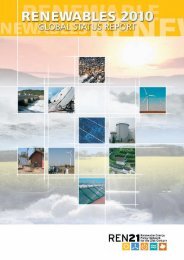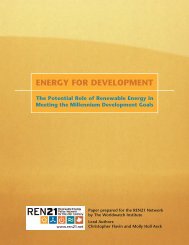RenewableS 2013 GlObal STaTUS RePORT - REN21
RenewableS 2013 GlObal STaTUS RePORT - REN21
RenewableS 2013 GlObal STaTUS RePORT - REN21
You also want an ePaper? Increase the reach of your titles
YUMPU automatically turns print PDFs into web optimized ePapers that Google loves.
Glossary<br />
Investment. Purchase of an item of value with an expectation<br />
of favourable future returns. In this report, new investment<br />
in renewable energy refers to investment in: technology<br />
research and development, commercialisation, construction<br />
of manufacturing facilities, and project development (including<br />
construction of wind farms, purchase and installation of solar<br />
PV systems). Total investment refers to new investment plus<br />
merger and acquisition (M&A) activity (the refinancing and sale<br />
of companies and projects).<br />
Investment tax credit. A taxation measure that allows investments<br />
in renewable energy to be fully or partially deducted from<br />
the tax obligations or income of a project developer, industry,<br />
building owner, etc.<br />
Joule/Kilojoule/Megajoule/Gigajoule/Terajoule/<br />
Petajoule/Exajoule. A Joule (J) is a unit of work or energy<br />
equal to the energy expended to produce one Watt of power<br />
for one second. For example, one Joule is equal to the energy<br />
required to lift an apple straight up by one metre. The energy<br />
released as heat by a person at rest is about 60 J per second.<br />
A kilojoule (kJ) is a unit of energy equal to one thousand (10 3 )<br />
Joules; a megajoule (MJ) is one million (10 6 ) Joules; and so on.<br />
The potential chemical energy stored in one barrel of oil and<br />
released when combusted is approximately 6 GJ; a tonne of dry<br />
wood contains around 20 GJ of energy.<br />
Leasing or lease-to-own. A fee-for-service arrangement in<br />
which a leasing company (generally an intermediary company,<br />
cooperative, or NGO) buys stand-alone renewable energy<br />
systems and installs them at customer sites, retaining ownership<br />
until the customer has made all payments over the lease<br />
period. Because the leasing periods are longer than most<br />
consumer finance terms, the monthly fees can be lower and the<br />
systems affordable for a larger segment of the population.<br />
Levelised Cost of Energy (LCOE). The unique cost price of<br />
energy outputs (e.g., USD/kWh or USD/GJ) of a project that<br />
makes the present value of the revenues equal to the present<br />
value of the costs over the lifetime of the project.<br />
Mandate/Obligation. A measure that requires designated<br />
parties (consumers, suppliers, generators) to meet a minimum,<br />
and often gradually increasing, target for renewable energy,<br />
such as a percentage of total supply or a stated amount of<br />
capacity. Costs are generally borne by consumers. Mandates<br />
can include renewable portfolio standards (RPS); building<br />
codes or obligations that require the installation of renewable<br />
heat or power technologies (often in combination with energy<br />
efficiency investments); renewable heat purchase requirements;<br />
and requirements for blending biofuels into transport fuel.<br />
Market concession model. A model in which a private<br />
company or NGO is selected through a competitive process<br />
and given the exclusive obligation to provide energy services to<br />
customers in its service territory, upon customer request. The<br />
concession approach allows concessionaires to select the most<br />
appropriate and cost-effective technology for a given situation.<br />
Net metering. A regulated arrangement in which utility customers<br />
who have installed their own generating systems pay only<br />
for the net electricity delivered from the utility (total consumption<br />
minus on-site self-generation). A variation that employs<br />
two meters with differing tariffs for purchasing electricity and<br />
exporting excess electricity off-site is called “net billing.”<br />
Ocean energy. Energy captured from ocean waves (generated<br />
by wind passing over the surface), tides, salinity gradients, and<br />
ocean temperature differences. Wave energy converters capture<br />
the energy of surface waves to generate electricity; tidal<br />
stream generators use kinetic energy of moving water to power<br />
turbines; and tidal barrages are essentially dams that cross tidal<br />
estuaries and capture energy as tides flow in and out.<br />
Power. The rate at which energy is converted per unit of time,<br />
expressed in Watts (Joules/second).<br />
Production tax credit. A taxation measure that provides the<br />
investor or owner of a qualifying property or facility with an<br />
annual tax credit based on the amount of renewable energy<br />
(electricity, heat, or biofuel) generated by that facility.<br />
Public competitive bidding (also called auction or tender).<br />
A procurement mechanism by which public authorities solicit<br />
bids for a given amount of renewable energy supply or capacity,<br />
generally based on price. Sellers offer the lowest price<br />
they would be willing to accept, but typically at prices above<br />
standard market levels.<br />
Pumped storage hydropower. Plants that pump water from a<br />
lower reservoir to a higher storage basin using surplus electricity,<br />
and reverse the flow to generate electricity when needed.<br />
They are not energy sources but means of energy storage and<br />
can have overall system efficiencies of around 80–90%.<br />
Regulatory policy. A rule to guide or control the conduct of<br />
those to whom it applies. In the renewable energy context,<br />
examples include mandates or quotas such as renewable<br />
portfolio standards, feed-in tariffs, biofuel blending mandates,<br />
and renewable heat obligations.<br />
Renewable energy certificate (REC). A certificate awarded to<br />
certify the generation of one unit of renewable energy (typically<br />
1 MWh of electricity but also less commonly of heat). In systems<br />
based on RECs, certificates can be accumulated to meet<br />
renewable energy obligations and also provide a tool for trading<br />
among consumers and/or producers. They also are a means of<br />
enabling purchases of voluntary green energy.<br />
Renewable energy target. An official commitment, plan,<br />
or goal set by a government (at the local, state, national, or<br />
regional level) to achieve a certain amount of renewable energy<br />
by a future date. Some targets are legislated while others are<br />
set by regulatory agencies or ministries.<br />
Modern bioenergy. Energy derived efficiently from solid, liquid,<br />
and gaseous biomass fuels for modern applications, such<br />
as space heating, electricity generation, combined heat and<br />
power, and transport (as opposed to traditional bioenergy).<br />
130




